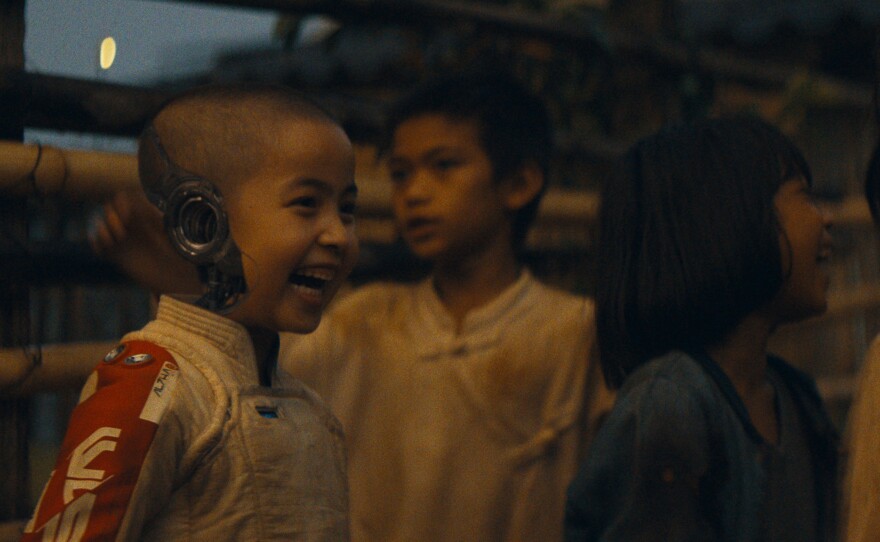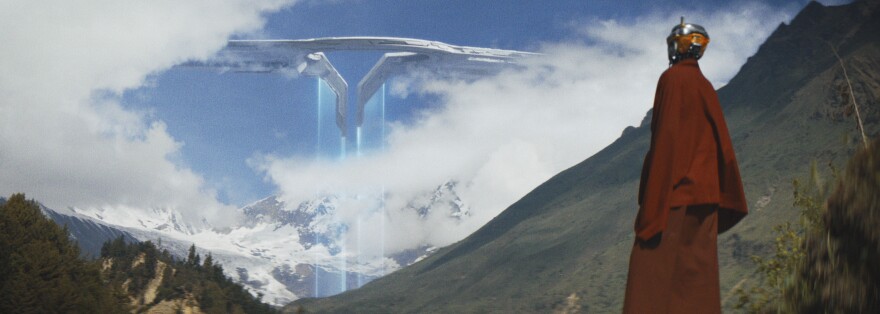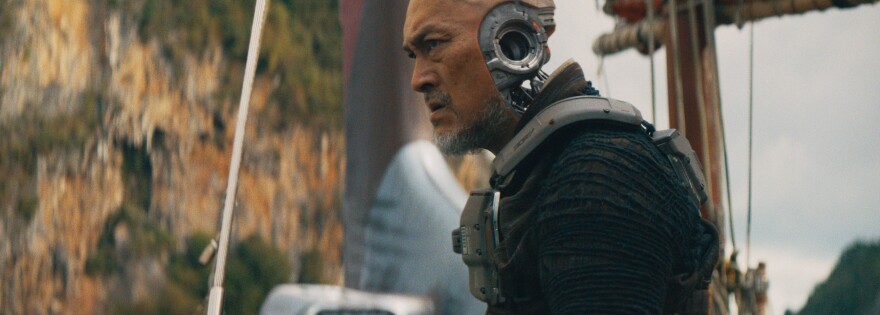As the Writers Guild reaches a tentative agreement with studios about the role of AI, Garth Edwards’ “The Creator” opens this weekend and suggests a future where AI becomes sentient and sympathetic.
“The Creator” might have more in common with Frankenstein’s monster than artificial intelligence since it seems pieced together from parts of other movies. One limb from “District 9,” another from “Blade Runner,” a torso from “Children of Men” or maybe it’s “Lone Wolf and Cub” or “The Mandalorian.” Then, throw in some DNA from “Rogue One” (also directed by Edwards), “Ghost in the Shell,” and “Apocalypse Now.” In other words, a lot of the film feels familiar and recycled.
Set in the near future of 2070, AI has become a sentient species referred to as “simulants.” They look human except for the exposed gears and machinery at the back of their heads. Why they went this far to look perfectly human and then stopped short of one final detail is a mystery.
A cheery industrial video explains the rise of machines and simulants as a useful part of the household and labor force. You could even endow one with your face and your memories so you could live on past your death. But simulants started to feel taken advantage of and revolted, but not in the Skynet/Terminator sort of way. Although the president does blame AI for detonating a nuclear missile that destroyed Los Angeles (more on this later). This provokes the U.S. to declare war on the AI, which also sets the U.S. in opposition to “New Asia,” a simulant-sympathetic country.
Joshua (John David Washington) had been a special forces agent sent to infiltrate the simulants to track down and kill the Creator. But his wife (Gemma Chan), a simulant sympathizer, and unborn child disappear in a raid and are presumed dead. But years later, the U.S. government wants to recruit Joshua one last time to once again track down the Creator, who has made a weapon that threatens the United States Death Star-like space station (did I mention Edwards directed “Rogue One?") that has the power to wipe out all AI.

But the hitch is that the AI weapon is packaged in the body of an adorable little Asian girl (Madeleine Yuna Voyles) called Alphie. Yes, think Grogu or WALL-E or E.T. because she is Edwards’ not-so-secret weapon in wringing tears from quite a few audience members.
“The Creator” is engaging enough to watch with solid actors and impressive visuals. And at a time when people seem more worried about than welcoming of AI, the film feels almost daring to show sentient AI beings as more compassionate than humans, and therefore not to be feared but rather embraced as the next step in evolution.
“The Creator” has the big picture down — it builds a world, it advocates for peace and tolerance, it asks us not to fear something just because it is new or different — but it falters on the details.

There’s an onslaught of inconsistencies in the narrative ranging from the U.S. government’s flipflopping about killing the AI child-weapon or capturing it, to Alphie and Joshua bonding for no apparent reason, to the military trying to destroy all AI while employing it at every turn.
Then there are the plot holes that allow our two fugitives to travel around freely even with their faces plastered everywhere or that present us with the least secure military space station ever built. And most troublesome are Alphie’s powers that can be epic one moment and non-existent the next. There are also plot points that seem exceedingly important — like who really set off the nuclear missile that devastated LA — that seem tossed aside and never revisited or verified. And while stupid plot holes are never a good thing, they are exceptionally disruptive when they come at the emotional climax of a film and pull you out of the story to scratch your head and question the logic of what you just saw.
And then there are odd missteps like comic moments with animals, headless robots, and one-liners you’d expect in a Michael Bay movie.

And while Edwards tries to see AI in a new light, he falls victim to stereotypes about Asians and the trope of a Black savior. Plus there’s considerable violent imagery that harkens back to the Vietnam war. The problem is that the film seems oblivious to how such imagery can resonate. If you are going to have the U.S. military ruthlessly killing Asian civilians in scenes that look strikingly similar to the newsreel footage we saw from Vietnam then there should be some context or commentary. Otherwise it starts to look like “Rambo” (2008). Granted the Asians in “Rambo” were the villains and mere fodder to be mowed down, and in “The Creator” they are victims we are meant to sympathize with. But still, it feels callous and excessive.
And while I have no problem with the U.S. military presented as evil, imperialistic villains, and the Asians as the sympathetic victims in the AI war, I do feel that Edwards and his co-writer Chris Weitz cop out to stereotypes as a means of shorthand. If the U.S. military is the baddie, then they can just stop there and not waste time on any further development. And they know you can always count on Asians to epitomizes wisdom, spirituality and tradition. It may be a positive stereotype but it’s still a stereotype and still restricting.
Edwards first gained attention for his low-budget, art house sci-fi film, “Monsters” (2010). More recently he gained fame for working on mega-budget Hollywood franchise films such as “Rogue One” and the 2014 “Godzilla.”

In a way, “The Creator” lets Edwards revisit both “Monsters” and “Rogue One.”
In “Monsters,” Edwards sympathized with the alien creatures just as in “The Creator” he reveals empathy for the simulants. That goes counter to sci-fi expectations. “Monsters” was also the antithesis of a sci-fi action film. It was not about an alien invasion or the end of the world but rather about how life goes on rather mundanely after something catastrophic. It was a science fiction film in much the same way that Alfonso Cuarón’s "Children of Men" was. Both films put the science and the special effects in the background because both films were more concerned with human stories.
But now Edwards has a bigger (but not crazy big) budget, and can revisit this sci-fi terrain but with the money to do the big action scenes and render a futuristic world with more special effects. Yet he still wants to tell a very human story about learning to move forward and learn to live with something like alien monsters or, in this case, sentient AI. And both films draw parallels between the monsters/AI and oppressed and persecuted people.
“The Creator” also offers another take on a “Rogue One” style rebel mission that requires personal sacrifice.
“The Creator” aspires to deliver a smart, humanist sci-fi tale and it succeeds just enough to make you realize the potential that was missed.










